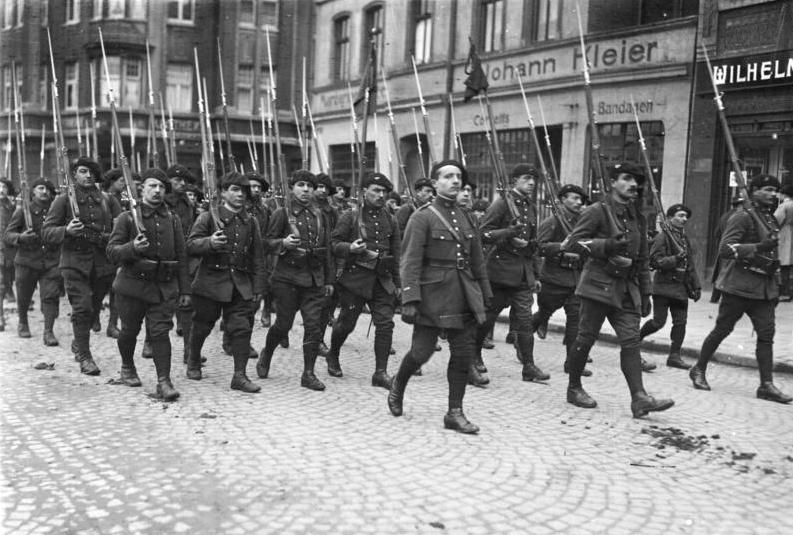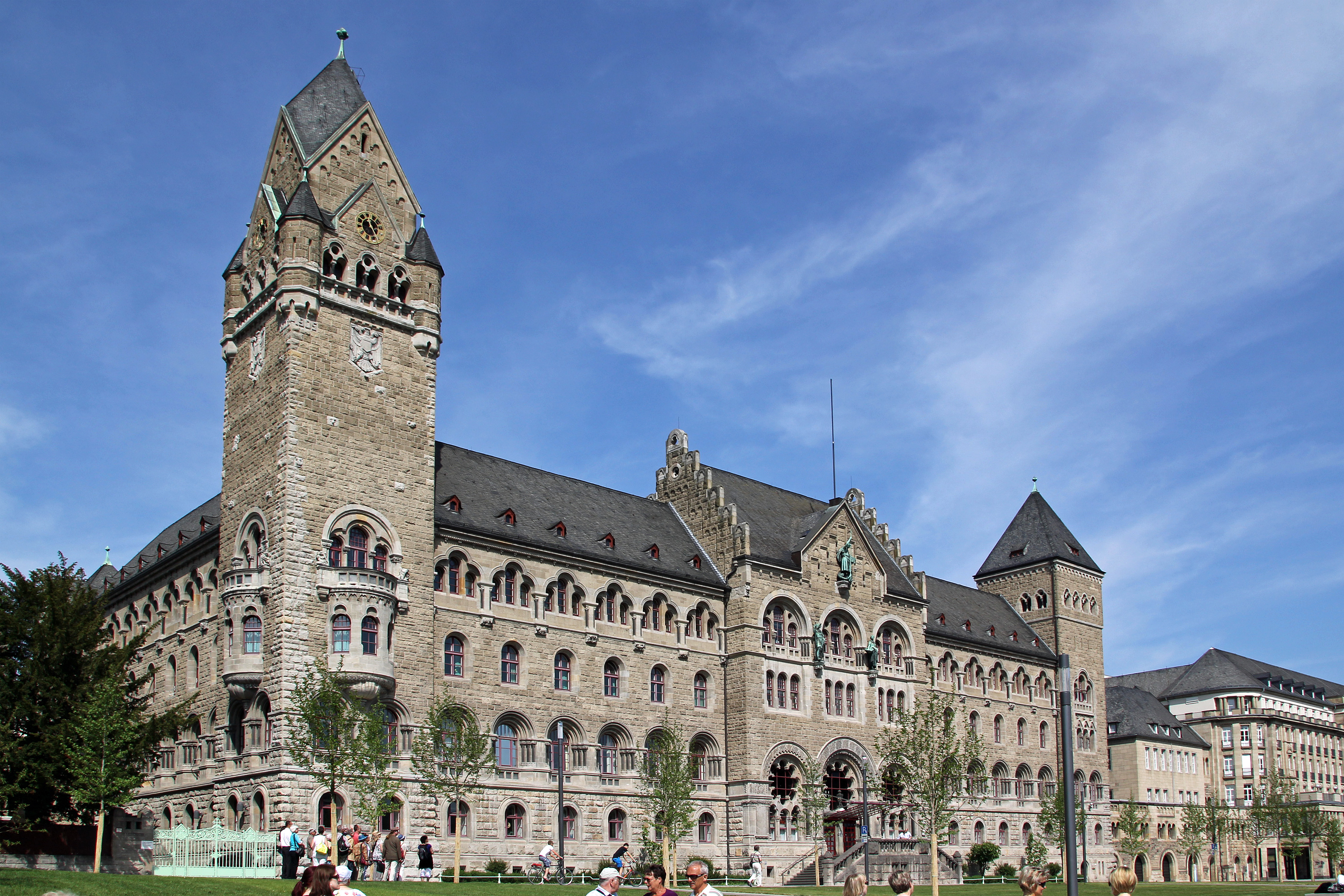|
Occupation Of The Rhineland
The Occupation of the Rhineland from 1 December 1918 until 30 June 1930 was a consequence of the collapse of the Imperial German Army in 1918, after which Germany's provisional government was obliged to agree to the terms of the 1918 armistice. This included accepting that the troops of the victorious powers occupied the left bank of the Rhine and four right bank "bridgeheads" with a radius around Cologne, Koblenz, Mainz and a radius around Kehl. Furthermore, the left bank of the Rhine and a strip east of the Rhine was declared a demilitarized zone. The Treaty of Versailles repeated these provisions, but limited the presence of the foreign troops to fifteen years after the signing of the treaty (until 1934). The purpose of the occupation was on the one hand to give France security against a renewed German attack, and on the other to serve as a guarantee for reparations obligations. After this was apparently achieved with the Young Plan, the occupation of the Rhinela ... [...More Info...] [...Related Items...] OR: [Wikipedia] [Google] [Baidu] |
French Third Republic
The French Third Republic (french: Troisième République, sometimes written as ) was the system of government adopted in France from 4 September 1870, when the Second French Empire collapsed during the Franco-Prussian War, until 10 July 1940, after the Fall of France during World War II led to the formation of the Vichy government. The early days of the Third Republic were dominated by political disruptions caused by the Franco-Prussian War of 1870–1871, which the Republic continued to wage after the fall of Emperor Napoleon III in 1870. Harsh reparations exacted by the Prussians after the war resulted in the loss of the French regions of Alsace (keeping the Territoire de Belfort) and Lorraine (the northeastern part, i.e. present-day department of Moselle), social upheaval, and the establishment of the Paris Commune. The early governments of the Third Republic considered re-establishing the monarchy, but disagreement as to the nature of that monarchy and the rightfu ... [...More Info...] [...Related Items...] OR: [Wikipedia] [Google] [Baidu] |
American Expeditionary Forces
The American Expeditionary Forces (A. E. F.) was a formation of the United States Army on the Western Front of World War I. The A. E. F. was established on July 5, 1917, in France under the command of General John J. Pershing. It fought alongside French Army, British Army, Canadian Army, New Zealand Army and Australian Army units against the Imperial German Army. A small number of A. E. F. troops also fought alongside Italian Army units in that same year against the Austro-Hungarian Army. The A. E. F. helped the French Army on the Western Front during the Aisne Offensive (at the Battle of Château-Thierry and Battle of Belleau Wood) in the summer of 1918, and fought its major actions in the Battle of Saint-Mihiel and the Meuse-Argonne Offensive in the latter part of 1918. Formation President Woodrow Wilson initially planned to give command of the A. E. F. to Gen. Frederick Funston, but after Funston's sudden death, Wilson appointed Major General John J. Persh ... [...More Info...] [...Related Items...] OR: [Wikipedia] [Google] [Baidu] |
John J
John is a common English name and surname: * John (given name) * John (surname) John may also refer to: New Testament Works * Gospel of John, a title often shortened to John * First Epistle of John, often shortened to 1 John * Second Epistle of John, often shortened to 2 John * Third Epistle of John, often shortened to 3 John People * John the Baptist (died c. AD 30), regarded as a prophet and the forerunner of Jesus Christ * John the Apostle (lived c. AD 30), one of the twelve apostles of Jesus * John the Evangelist, assigned author of the Fourth Gospel, once identified with the Apostle * John of Patmos, also known as John the Divine or John the Revelator, the author of the Book of Revelation, once identified with the Apostle * John the Presbyter, a figure either identified with or distinguished from the Apostle, the Evangelist and John of Patmos Other people with the given name Religious figures * John, father of Andrew the Apostle and Saint Peter * ... [...More Info...] [...Related Items...] OR: [Wikipedia] [Google] [Baidu] |
Moselle
The Moselle ( , ; german: Mosel ; lb, Musel ) is a river that rises in the Vosges mountains and flows through north-eastern France and Luxembourg to western Germany. It is a bank (geography), left bank tributary of the Rhine, which it joins at Koblenz. A small part of Belgium is in its drainage basin, basin as it includes the Sauer and the Our River, Our. Its lower course "twists and turns its way between Trier and Koblenz along one of Germany's most beautiful river valleys."''Moselle: Holidays in one of Germany's most beautiful river valleys'' at www.romantic-germany.info. Retrieved 23 Jan 2016. In this section the land to the north is the Eifel which stretches into Belgium; to the south lies the Hunsrück. The river flows through a region that was cultivated by the Ro ... [...More Info...] [...Related Items...] OR: [Wikipedia] [Google] [Baidu] |
United States
The United States of America (U.S.A. or USA), commonly known as the United States (U.S. or US) or America, is a country primarily located in North America. It consists of 50 U.S. state, states, a Washington, D.C., federal district, five major unincorporated territories, nine United States Minor Outlying Islands, Minor Outlying Islands, and 326 Indian reservations. The United States is also in Compact of Free Association, free association with three Oceania, Pacific Island Sovereign state, sovereign states: the Federated States of Micronesia, the Marshall Islands, and the Palau, Republic of Palau. It is the world's List of countries and dependencies by area, third-largest country by both land and total area. It shares land borders Canada–United States border, with Canada to its north and Mexico–United States border, with Mexico to its south and has maritime borders with the Bahamas, Cuba, Russia, and other nations. With a population of over 333 million, it is the List of ... [...More Info...] [...Related Items...] OR: [Wikipedia] [Google] [Baidu] |
Belgium 1919 Medal By Dubois Occupation Of Germany After The Peace Of Versailles, Reverse
Belgium, ; french: Belgique ; german: Belgien officially the Kingdom of Belgium, is a country in Northwestern Europe. The country is bordered by the Netherlands to the north, Germany to the east, Luxembourg to the southeast, France to the southwest, and the North Sea to the northwest. It covers an area of and has a population of more than 11.5 million, making it the 22nd most densely populated country in the world and the 6th most densely populated country in Europe, with a density of . Belgium is part of an area known as the Low Countries, historically a somewhat larger region than the Benelux group of states, as it also included parts of northern France. The capital and largest city is Brussels; other major cities are Antwerp, Ghent, Charleroi, Liège, Bruges, Namur, and Leuven. Belgium is a sovereign state and a federal constitutional monarchy with a parliamentary system. Its institutional organization is complex and is structured on both regional and linguist ... [...More Info...] [...Related Items...] OR: [Wikipedia] [Google] [Baidu] |
Remilitarization Of The Rhineland
The remilitarization of the Rhineland () began on 7 March 1936, when German military forces entered the Rhineland, which directly contravened the Treaty of Versailles and the Locarno Treaties. Neither France nor Britain was prepared for a military response, so they did not act. After 1939 commentators often said that a strong military move in 1936 might have ruined Hitler's expansionist plans. However, recent historiography agrees that both public and elite opinion in Britain and France strongly opposed a military intervention, and neither had an army prepared to move in. After the end of World War I, the Rhineland came under Allied occupation. Under the 1919 Treaty of Versailles, the German military was forbidden from all territories west of the Rhine or within 50 km east of it. The 1925 Locarno Treaties reaffirmed the then-permanently-demilitarized status of the Rhineland. In 1929, German Foreign Minister Gustav Stresemann negotiated the withdrawal of the Allied forces. ... [...More Info...] [...Related Items...] OR: [Wikipedia] [Google] [Baidu] |
Occupation Of The Ruhr
The Occupation of the Ruhr (german: link=no, Ruhrbesetzung) was a period of military occupation of the Ruhr region of Germany by France and Belgium between 11 January 1923 and 25 August 1925. France and Belgium occupied the heavily industrialized Ruhr Valley in response to Germany defaulting on reparation payments dictated by the victorious powers after World War I in the Treaty of Versailles. Occupation of the Ruhr worsened the economic crisis in Germany, and German civilians engaged in acts of passive resistance and civil disobedience, during which 130 were killed. France and Belgium, facing economic and international pressure, accepted the Dawes Plan to restructure Germany's payment of war reparations in 1924 and withdrew their troops from the Ruhr by August 1925. The Occupation of the Ruhr contributed to German rearmament and the growth of radical right-wing and left-wing movements in Germany. Background The Ruhr region had been occupied by Allied troops in ... [...More Info...] [...Related Items...] OR: [Wikipedia] [Google] [Baidu] |
Western Germany 1923 En
Western may refer to: Places *Western, Nebraska, a village in the US *Western, New York, a town in the US *Western Creek, Tasmania, a locality in Australia *Western Junction, Tasmania, a locality in Australia *Western world, countries that identify with shared "Western" culture Arts and entertainment Films * ''Western'' (1997 film), a French road movie directed by Manuel Poirier * ''Western'' (2017 film), a German-Austrian film Genres *Western (genre), a category of fiction and visual art centered on the American Old West **Western fiction, the Western genre as featured in literature **Western music (North America), a type of American folk music Music * ''Westerns'' (EP), an EP by Pete Yorn *WSTRN, a British hip hop group from west London Business *The Western, a closed hotel/casino in Las Vegas, United States *Western Cartridge Company, a manufacturer of ammunition *Western Publishing, a defunct publishing company Educational institutions *Western Washington University i ... [...More Info...] [...Related Items...] OR: [Wikipedia] [Google] [Baidu] |
Rhine Province
The Rhine Province (german: Rheinprovinz), also known as Rhenish Prussia () or synonymous with the Rhineland (), was the westernmost province of the Kingdom of Prussia and the Free State of Prussia, within the German Reich, from 1822 to 1946. It was created from the provinces of the Lower Rhine and Jülich-Cleves-Berg. Its capital was Koblenz and in 1939 it had 8 million inhabitants. The Province of Hohenzollern was militarily associated with the Oberpräsident of the Rhine Province. The Rhine Province was bounded on the north by the Netherlands, on the east by the Prussian provinces of Westphalia and Hesse-Nassau, and the grand duchy of Hesse-Darmstadt, on the southeast by the Palatinate (a district of the Kingdom of Bavaria), on the south and southwest by Lorraine, and on the west by Luxembourg, Belgium and the Netherlands. The small exclave district of Wetzlar, wedged between the grand duchy states Hesse-Nassau and Hesse-Darmstadt was also part of the Rhine Province. ... [...More Info...] [...Related Items...] OR: [Wikipedia] [Google] [Baidu] |

.png)



